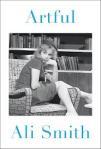‘Writers sit down,’ Ali Smith said, in her talk on the weekend. ‘But books make books. This is one of the freedoms I have inherited.’

Ali in her garden in Cambridge
Ali is one of the wisest people I know, and she gave a brilliant performance at the wordfest, discussing her new book, Artful, a series of essays on literature that were originally lectures given in Oxford. Only being Ali, she wrote the lectures in and through short stories, ‘giving herself permission’ as she put it, to do something very different with the space of a lecture:
I think fiction is authority, fiction is truth. To go directly to the source of truth that is fiction allows us to question and to be held, to be suspended in time. There is a root and a route between art and mortality; fiction becomes an obvious way to hold many things at once.’
What I think Ali was getting at here is that stories are the only way we have of making sense. They are also extremely familiar to us, given that we use stories everywhere, in the way we explain ourselves, what happens to us, how we account for the world to children, how we envisage new futures. Stories organize every aspect of our lives, from start to finish, but they also give us a timescale – narrative time – by means of which we can hope, anticipate and fear. By means of consequence and causality, the two axis of fiction, we imagine that this event provokes this result, which leads onto that event, and so on. So stories manage the paradox of taking us out of our immediate experience, transcending it to view it more clearly, and they embed us in our lives allowing us to hold the threads of any number of ongoing plots and subplots as if we had some control over them. Fiction and its truths tell us what has happened, what is happening and what will happen.
 Ali was talking about how she realised she only had a couple of weeks to write her lectures in, and she didn’t know where to begin. So she went to the shelf and took down Dickens’ novel, Oliver Twist, and started to read it. That reading sparked off an idea, and she decided to read the novel over the course of writing the lectures, and to use something in the novel as a guideline or a springboard every time she had a new lecture to write. She spoke of the way that the reader can feel Dickens thinking and planning as he writes. This was a story that began its life as magazine installments; Dickens was creating his story without knowing the end, placing things in the narrative as he went along, hoping they might be useful or helpful later in the story. Ali decided to write her lectures on the same principle: ‘It gave me a way of trusting the serendipity of art; of trusting in the thing beyond us that organises art.’
Ali was talking about how she realised she only had a couple of weeks to write her lectures in, and she didn’t know where to begin. So she went to the shelf and took down Dickens’ novel, Oliver Twist, and started to read it. That reading sparked off an idea, and she decided to read the novel over the course of writing the lectures, and to use something in the novel as a guideline or a springboard every time she had a new lecture to write. She spoke of the way that the reader can feel Dickens thinking and planning as he writes. This was a story that began its life as magazine installments; Dickens was creating his story without knowing the end, placing things in the narrative as he went along, hoping they might be useful or helpful later in the story. Ali decided to write her lectures on the same principle: ‘It gave me a way of trusting the serendipity of art; of trusting in the thing beyond us that organises art.’
This made me think of the Norwegian writer, Knausgaard that I had heard talking the previous day, and the way he had written his memoir by sitting down every day, taking a shameful incident from his past and writing about it, allowing himself to follow whatever energy arose from the narration, aware that he would remember more and more about the event the more he wrote. For both Knausgaard and Ali Smith, writing was about trusting the process of writing to fuel its own internal creative engine.
What also struck me about these two authors was how honest they were, how authentic as individuals. I know Ali quite well, and she is admirably straight, always. As the chair of the session introduced her and listed all her achievements, she was shaking her head, and I know she feels that all this glitter of art has nothing at all to do with the writing she does, or with who she is. She is the least pretentiously starry person I have ever met, although she has every reason to rest on her accolades. I was struck also by the way the Norwegian writer kept refusing the glib and conventional stories that his chair wanted to place over his experience. Several times she hoped to encourage him towards saying that writing his memoir had been cathartic in some way, or that it had improved the quality of his life or simply provided some therapy, but he refused that orthodox storyline every time. No, writing the book had not solved his problems, becoming a famous author was not the route to happiness. Life was one thing, storytelling was another.
I think that storytelling has tremendous power, far more than we realise, and for this reason, when it comes to life, we can abuse it. Or maybe not abuse it, but lean on it too hard, rely on it too much. What these two authors said to me was that it was one thing to trust to the unfolding of events to turn into a story eventually, quite another to take a story from the shelf, readymade, and try to make real events fit it. I think we do the latter far too much in our culture at the moment, leaning too heavily on stories of triumph over adversity, of achievement and success, of catastrophe and tragedy, when life is very unlikely to conform to such neat and tidy plots. We see the outside of people and assume stories about them that take no account of their messy insides, we enter periods of uncertainty and insecurity and rush to find some narrative –any narrative – that will fit, rather than trust to the uncertainty to gradually resolve itself, or even present brand new twists, new thoughts and ideas and possibilities. In other words, we let a few clichéd stories to dominate, rather than allowing the enormous range of potential stories out there to take shape of their own accord. Life is too rich and complex and difficult, really, to be treated this way. I’ll leave the last word to Ali, who when asked about the playful, multiple-storied approach she took to writing said: ‘I don’t have a choice; if there’s a story then there’s another story. There’s always another story.’ I think her latest book is going to be glorious.
I’ll be away from the Reading Room for about a week, as I’m in great danger of missing my deadline for an essay on Simone de Beauvoir and blogging takes up too much writing time. A case of a story here preventing any other story from happening, alas… See you all soon.
